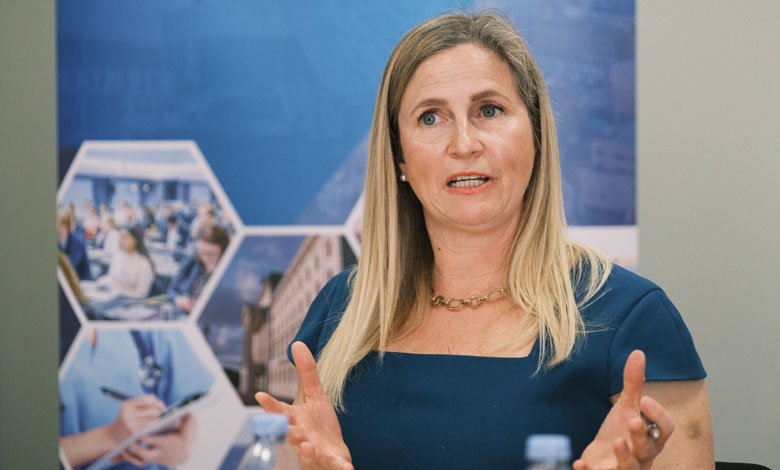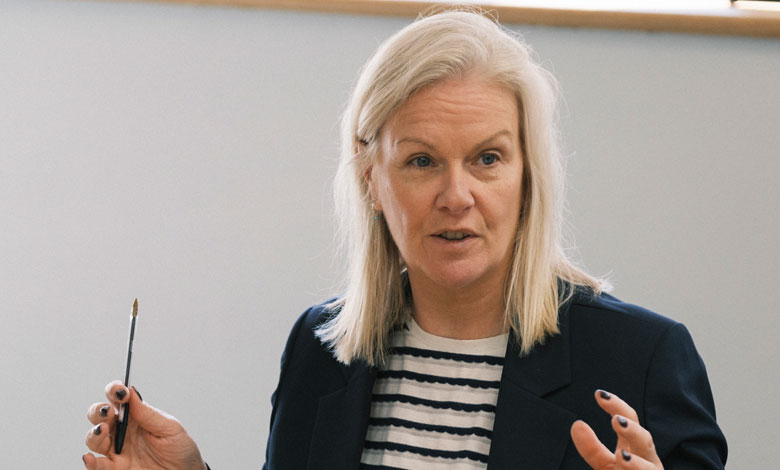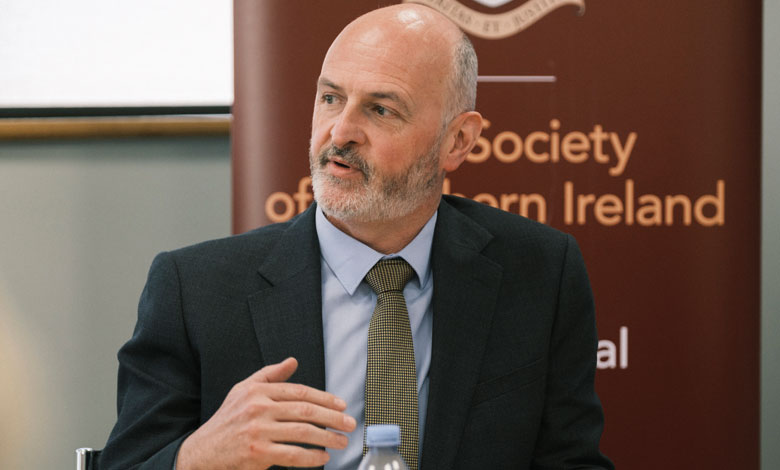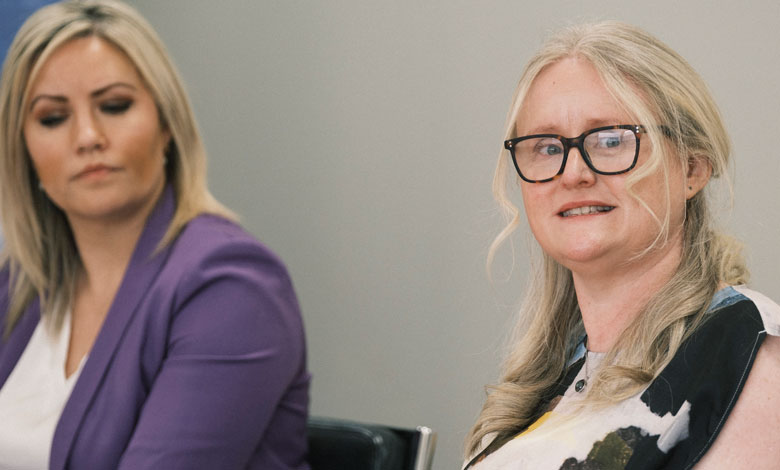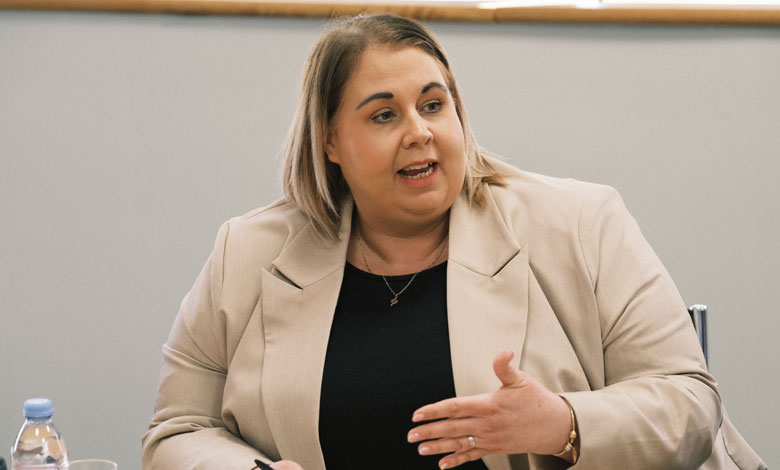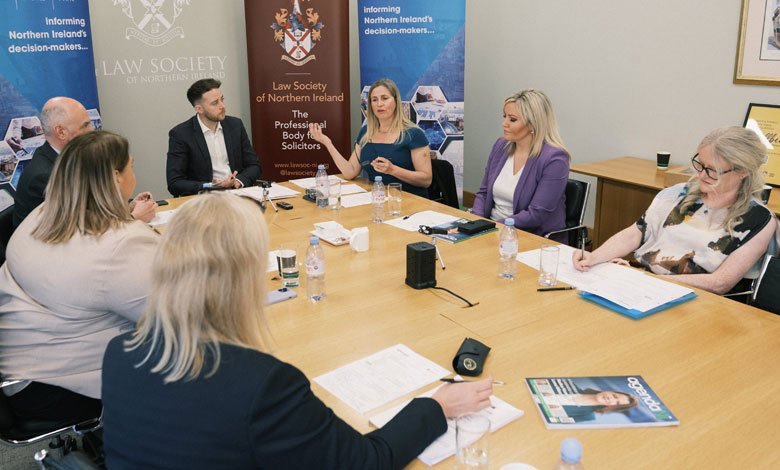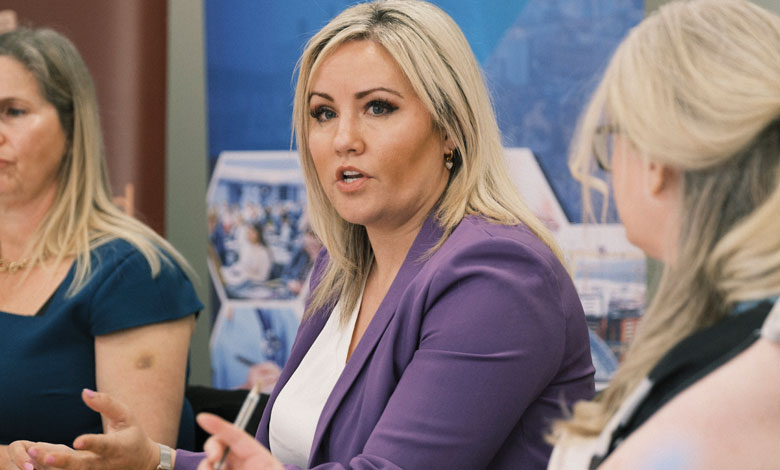The role of the solicitor in ending violence against women and girls
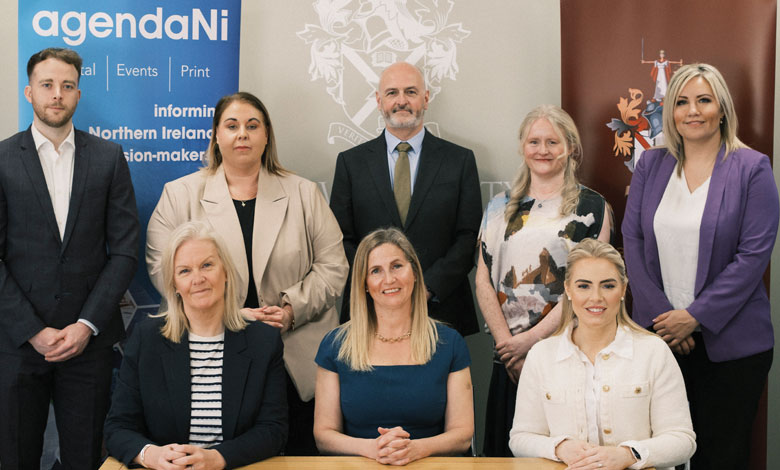
The Law Society of Northern Ireland gathered stakeholders from across the family law ecosystem – including voluntary service providers, family law practitioners, and criminal justice partners – in its Belfast city centre headquarters, for a round table discussion examining the role of the solicitor in ending violence against women and girls.
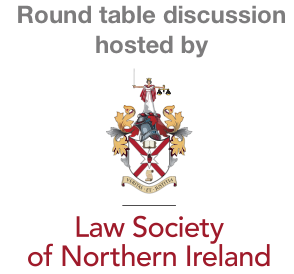 What is the significance of the role played by solicitors in gender-based violence cases?
What is the significance of the role played by solicitors in gender-based violence cases?
Claire Edgar
Solicitors are often the first point of contact for victims of abuse, so we have a critical role in ensuring that women feel believed, heard, and able to be open about what has been happening in her life. In this context, the role of a solicitor is multifaceted; incorporating advice on financial circumstances, child maintenance, spousal maintenance, housing rights, children’s issues, protections against domestic abuse, and grounds for divorce. Solicitors must have a deep understanding of challenges faced by women in these circumstances. Beyond the initial stage, solicitors advise women at all stages of the legal process, including mounting legal applications on their behalf and defending legal applications brought against them.
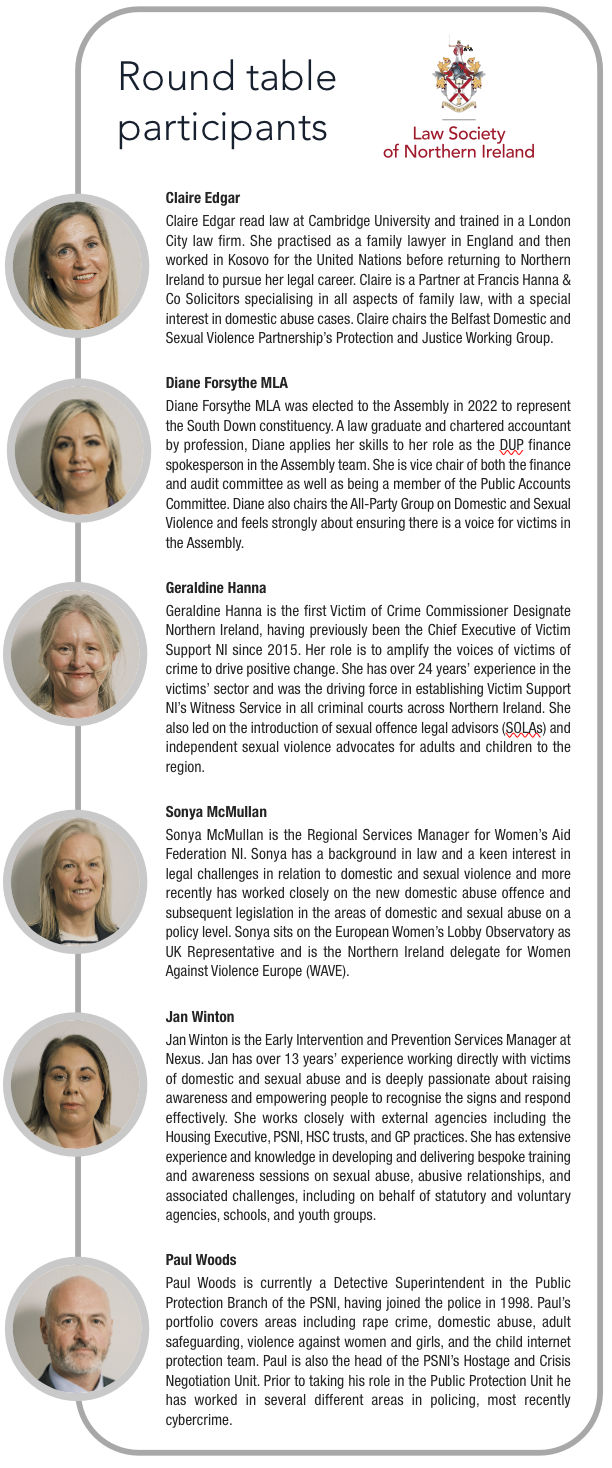
Diane Forsythe MLA
Solicitors ensure that victims feel they can come forward. From my perspective, the challenge for society is ensuring access to justice. For instance, many women have told me about how they cannot afford legal representation. There is also a significant challenge in the lack of access to legal aid in rural parts of Northern Ireland. We need to bridge these gaps and ensure that victims are supported right across society.
Geraldine Hanna
The fact that solicitors may be the first point of disclosure demonstrates the importance of the role they play, particularly with regard to protection orders and subsequent breaches which impact the criminal sphere. Northern Ireland is the only jurisdiction in the UK which has sexual offence legal advisors for victims of sexual violence. Their role is to provide independent legal advice to the victim about their privacy rights, which emphasises the diversity of work that solicitors do.
Sonya McMullan
When a woman is in a relationship in which domestic abuse, coercive control, emotional abuse, psychological abuse, or financial abuse is a feature, the challenge for the victim is regaining the control that has been taken from them. Being able to attend a solicitor’s office empowers victims because it gives them choice. Solicitors can outline the victim’s options and make it clear where they stand from a legal perspective. Women’s Aid often get referrals from solicitors who steer victims to a place where they will be supported. So the role is much more than just legal advice, it is about being holistically supportive.
Jan Wilton
Many victims will approach a solicitor before going to the police, meaning that the interaction with solicitors is often the first time they will have reached out for advice and support. The role of the solicitor here is of paramount significance because, depending on the interaction, it can either empower or disempower the victim.
Paul Woods
Victims’ interactions with the police will invariably either come just before or after a visit to a solicitor, the role of which is a critical part of the criminal justice system. Interactions between police and solicitors on these matters are often positive in that we have a shared responsibility and objective. This hinges on a victim-centred approach. Access to solicitors is also important as there is a societal obligation for victims to have the means of getting the justice they deserve.
What are the main barriers facing solicitors in representing victims of violence against women and girls?
Diane Forsythe MLA
Often, we are talking about extremely intimate types of offences. With children often involved, there are many dynamics at play. Solicitors are trying to establish the victims’ legal rights to the best of their abilities, while the victim is facing fundamental decisions such as deciding whether to go forward with the legal process. This is a difficult path for a solicitor to navigate, as they must be professional while providing the legal options to victims and accounting for the challenging personal circumstances of the person they are working with.
Geraldine Hanna
Anecdotally, solicitors emphasise the challenge around the complexity of the evidence required to meet the threshold for legal aid. Overall, people need to be fairly paid for their work, so ensuring fair remuneration is the key to supporting solicitors, both in these cases and more broadly. In addition, I think there is a strong case for ensuring that solicitors are properly trained across the board in domestic abuse and coercive control.
“We have an increasing number of solicitors who cannot financially justify taking on family law cases.”
Claire Edgar
Claire Edgar
Legal Aid is a serious challenge. Often in these cases, the victimised woman is the one who is least financially secure. While the abusive partner will have the financial wherewithal to pay for legal advice and access quality legal services, the victim will be reliant on legal aid. However, legal aid funding is not fit for purpose. The rates of legal aid that are payable now are the same as what was payable 30 years ago. We have an increasing number of solicitors who cannot financially justify taking on family law cases. We must question a system which introduces a Violence Against Women and Girls Strategy but does not fund it properly.
Sonya McMullan
The main problem is the lack of capacity among solicitors, as well as inadequate training. We are not encouraging enough young legal professionals to specialise in family law because it does not remunerate them fairly. The consequence is that some victims and survivors are having to sometimes travel 50 or 60 miles to access a solicitor. Plainly, this is not acceptable. We need greater incentive for young legal professionals to specialise in this area.
Paul Woods
Evidence is a common challenge shared by the PSNI and solicitors. Given the trauma victims have experienced, they will often articulate a fragmented narrative of events, which leaves them vulnerable to intensive cross-examination during legal proceedings. Given the rigorous nature of how the law is applied, alongside long waiting times in the system, many victims drop their cases because of the process they can be exposed to. The law can feel cold in its application, and we must draw lessons from that.
Jan Winton
A major barrier is often the complexity of cases. There is also an element of fear, because these are such serious, life-altering, and intimate repercussions. We need to adjust the system we have now to account for the challenges that victims face. This means having a trauma-informed perspective, enabling legal professionals to gather the evidence base to support their case while accounting for the challenges that victims face.
What are the opportunities for enhanced representation on behalf of victims?
Geraldine Hanna
The Department of Justice’s Enabling Access to Justice Reform Programme give us an opportunity for introspection. Training is key to building expertise in coercive control and domestic abuse across solicitor firms. Likewise, trauma-informed practice will assist in the representation of victims in the court arena. As in the case of Victim Support NI which delivers Sexual Offences Legal Adviser (SOLA) and Children’s Sexual Offences Legal Adviser (CSOLA) schemes, there is an opportunity for the secondment of solicitors to other organisations. This can address barriers to representation in that victims have access to expert representation in a nontraditional setting, including one stop shops which incorporate wraparound services.
“We are not encouraging enough young legal professionals to specialise in family law because it does not remunerate them fairly.”
Sonya McMullan
Sonya McMullan
Improved access to justice flows from community outreach. Women’s Aid Federation has one stop shops located in various parts of Northern Ireland which are administered by our local groups. Through these one stop shops, solicitors undertake work pro bono and on a rota basis. Similarly, the social justice hub in Ulster University is another example of a pro bono model which is having a positive impact. Collaboration between support agencies and solicitors in an advocate role is crucial. For instance, Belfast and Lisburn Women’s Aid is collaborating with the Public Prosecution Service to provide greater support for women through a criminal justice worker role.
Diane Forsythe MLA
We have an opportunity through the Programme for Government which lists ending violence against women and girls as a key commitment. Specifically, there is an opportunity to change perceptions of the role of the solicitor at an early stage. Through education, it is possible to reframe young people’s understanding of the profession and demonstrate that becoming a solicitor is a career pathway which assists others.
Claire Edgar
Ultimately, the role of the solicitor is life changing and this provides immense job satisfaction. However, solicitors must be adequately remunerated to avoid a scenario in which more people are seeking to practise family law while an increasing number of firms no longer offer that work because they cannot afford to do so. Collaboration and integrated services are also very important. As clients reach a stage where they are required to make important decisions, I want them to be empowered to do so. As such, I often refer my clients to Women’s Aid Federation NI.
Jan Winton
We must increase societal awareness of the criminal justice system; clearly and simply defining what the solicitor’s role is, what the PPS’s role is, and what the PSNI’s role is. Similarly, we must increase awareness of the availability of wraparound services and their limitations. The same applies to solicitors in assisting clients to understand their options. This enhanced knowledge will empower victims.
Paul Woods
There is an ongoing societal conversation in relation to violence against women and girls. Simultaneously, there is an opportunity to capture this momentum, showcase the role of solicitors, reframe the public perception of the law, and ultimately enhance the representation of victims. From a policing perspective, the way in which the approach to violence against women and girls was taken needed restructuring. In response, we changed our approach. The PSNI now approaches violence against women and girls in the same way as it approaches serious organised crime. As such, our Tackling Violence Against Women and Girls action plan is structured under the national VAWG framework, based upon four priority themes or ‘the four Ps’: preparing policing; protecting communities; pursuing perpetrators; and preventing people from committing violence against women and girls.
“There is an ongoing societal conversation in relation to violence against women and girls… there is an opportunity to capture this momentum…”
Paul Woods
What policy levers could optimise the role of solicitors in ending violence against women and girls?
Sonya McMullan
With its platform of 6,000 solicitors, The Law Society can be a major advocate for change and lead a public campaign to end violence against women and girls. In recent years, there has been a significant increase in legislation – from coercive control to non-fatal strangulation – and it is difficult for solicitors to keep pace with the associated information. In this context, there are several emerging CPD opportunities.
Jan Winton
We must be proactive in publicly demonstrating a commitment to ending violence against women and girls. Key to this is funding, training, awareness raising, and the ability to contribute to policymaking via public consultation. As implementation of the Strategic Framework to End Violence Against Women and Girls progresses, we must all use of our platforms and resources to maximum effect.
Geraldine Hanna
We have a commitment to ending violence against women and girls in the Programme for Government, we have the Strategic Framework to End Violence Against Women and Girls, we have the Domestic and Sexual Abuse Strategy 2024-2031, and we have the Enabling Access to Justice Reform Programme. Each of these directly relate to the pivotal role of solicitors and to echo Sonya’s point, The Law Society can play a key role in championing opposition to violence against women and girls, both in terms of workplace wellbeing and in terms of representing victims. Our 6,000 solicitors can help shape policymaking – as opposed to responding to a legislative proposal – by actively informing the discussion.
“Violence against women and girls is a society-wide challenge which necessitates a society-wide response.”
Geraldine Hanna
Diane Forsythe MLA
Given the commitment in the Programme for Government and a desire to deliver, the challenge of ending violence against women and girls has the attention of elected representatives. There is an opportunity for The Law Society to demonstrate the role of solicitors in ending violence against women and girls through, for example, engagement with each of the 11 local council areas. In terms of public sector transformation, I feel strongly about the role that the voluntary and community sector can play in the delivery of public services and the return on investment this can unlock.
Paul Woods
In writing our Violence Against Women and Girls Action Plan, the first theme the PSNI considered was building trust and confidence in policing. We had to hold a mirror up to our own policies and processes, using this as an opportunity to collaborate with public and private sector partners to provide training on behalf of our workforce. For us, this theme was a question of credibility in our collaboration with representatives of victims and survivors. For instance, we introduced bystander training to cultivate an open, honest, and trustworthy environment among a workforce of 6,000 people. It is something that has benefitted policing and could be replicated among The Law Society’s membership.
Claire Edgar
Amid a lack of funding, solicitors who are persevering with this work are feeling very demoralised. In that context, I am heartened by this discussion and by the fact that external stakeholders are so supportive of the legal profession and are contributing the interesting ideas that we have heard. However, fundamentally, unless they are adequately funded, solicitors cannot continue to undertake this work.
How can education around violence against women and girls increase public awareness of the important role played by solicitors in victims’ journeys?
“We must be proactive in publicly demonstrating a commitment to ending violence against women and girls.”
Jan Winton
Jan Winton
It is about applying a dual approach; educating both stakeholders working in this arena, but also wider society. It is not just about raising awareness among those who work in the sector; it is about reaching every single person. When Nexus undertakes bystander training, the relevance to every single one of us is apparent.
Claire Edgar
We are now living in an era in which toxic masculinity is resurging. Personified by Andrew Tate and Donald Trump, misogynistic views are gaining traction. We need to be able to reach people beyond those who are already passionate and committed to ending violence against women and girls. The media has a role to play here. In the legal aid discourse, media often platforms a stereotype of ‘fat cat’ solicitors. In reality, this could not be further from the truth, and we need the media to be responsible in its reporting.
Sonya McMullan
There is a need for early intervention training. If people readily knew their options, it could help prevent abuse from taking place. Furthermore, in a legal system which faces financial challenges, prevention would reduce demand on the court system as well as costs. We need the legal profession to engage with the public at large in order to increase awareness of the important role played by solicitors in victims’ journeys.
Paul Woods
Education in this context means communicating a simple message and ensuring that people are aware of their rights and their options. There is a lot of information out there and the challenge is compiling it into a single coherent and understandable format to empower people.
Geraldine Hanna
Violence against women and girls is a society-wide challenge which necessitates a society-wide response. Every Executive department has a role to play. Meanwhile, the whole legal aid structure must be simplified. This will help with communication. By way of example, when speaking with a group of stakeholders, I attempted to describe legal aid waivers using a succinct, one-minute explainer. This was very challenging, but we must get to a point where this is the conventional approach.
“Given the commitment in the Programme for Government… the challenge of ending violence against women and girls has the attention of elected representatives.”
Diane Forsythe MLA
Diane Forsythe MLA
Many advertising campaigns are targeted at misogynistic behaviour. However, to end the violence against women and girls, we must reach out to women by amplifying the voices of victims and their stories. This is a victim-oriented approach, which encourages women to come forward and explain the entire process from their first interaction with the solicitor, and the subsequent journey through the justice system. This will encourage more people to come forward, make the process more relatable, and help both solicitors and victims.

